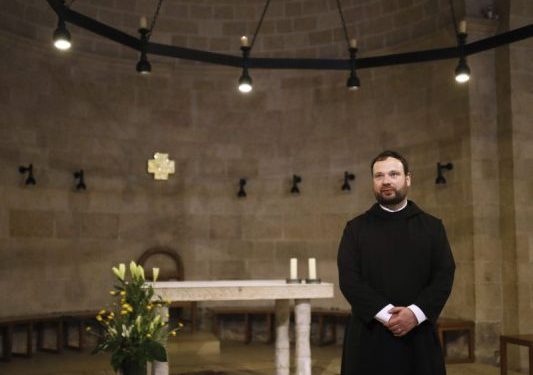The recent incident of an Ultra-Orthodox man being seen spitting at a Christian priest in Jerusalem has once again brought the issue of religious tensions to the forefront. This shocking act of bigotry and intolerance challenges the notion of coexistence in a city that holds immense significance for multiple faiths. Such incidents not only highlight the urgent need for interfaith dialogue and understanding but also expose the deep-rooted prejudices that still exist within certain segments of society.
The incident took place near the Church of the Holy Sepulchre, a site revered by Christians worldwide. The priest, who was peacefully conducting a religious procession, became the target of a disrespectful and demeaning act. The incident was captured on camera, and the footage quickly spread across social media platforms, prompting widespread condemnation from both local and international communities.
This incident is not an isolated event, but rather a reflection of the broader tension that exists between different religious groups in Jerusalem. The city, known for its diverse religious heritage, has long been a hotbed of controversy and conflict. The issue is further complicated by the presence of Ultra-Orthodox Jewish communities, who adhere strictly to religious practices and often ostracize anyone who does not conform to their beliefs.
The actions of this Ultra-Orthodox man are in direct contradiction to the principles of respect and tolerance that all faiths preach. The incident is a reminder that despite living side by side in such a religiously significant city, there are still factions within society that foster hatred and hostility towards those who practice different religions.
On a positive note, the incident has rekindled a much-needed conversation about the importance of dialogue and understanding between different religious groups. Leaders from various faiths have come together to express their solidarity with the Christian community in Jerusalem and emphasize the need for peaceful coexistence.
Efforts to bridge the divide between different religious groups should not solely rest with religious leaders but must involve the broader society as well. Education plays a crucial role in fostering tolerance and breaking down the barriers of misunderstanding and prejudice. Schools should incorporate religious studies courses that promote mutual respect and understanding for different faiths. Interfaith dialogue and events should be organized, bringing together members of different religious communities to foster dialogue and exchange ideas.
Moreover, government authorities have a responsibility to crack down on acts of religious hatred and discrimination. Laws should be in place to protect individuals and communities from such acts, ensuring that justice is served swiftly and decisively.
Addressing the issue of religious tensions in Jerusalem requires a comprehensive and collective effort. It is not enough to condemn isolated incidents or to rely solely on the efforts of religious leaders. Rather, society as a whole must recognize and challenge the prejudices and misconceptions that exist within their communities.
The incident of the Ultra-Orthodox man spitting at a Christian priest is a stark reminder that hatred and intolerance still persist in our society. It is crucial for individuals and communities to stand together in condemning such acts and work towards building a more inclusive and harmonious society—one that embraces diversity and celebrates the richness of different faiths. Ultimately, it is through dialogue, education, and a collective commitment to understanding that the city of Jerusalem can truly become a symbol of peaceful coexistence.

















